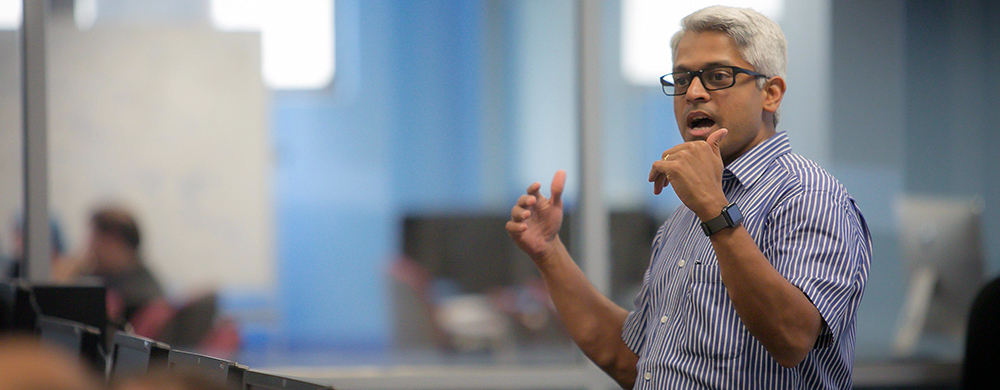CSU, CMSD Receive $1 Million Grant to Expand CSforAll Initiative

Cleveland State University and the Cleveland Metropolitan School District have received a $1 million grant from the National Science Foundation to expand their CSforAll initiative. The program, led by CSU faculty Nigamanth Sridhar, Debbie Jackson, and Brian Harper, seeks to train high school teachers in the main concepts of computer science to ensure that all students in the district can receive training in the discipline. A key focus of the new NSF-funded project is to ensure that the courses are available to every student, regardless of learning ability or demographic constraints. The grant will provide the team support to enhance a pilot project funded by the Cleveland Foundation.
“Computer science is fundamentally re-defining how we live in society and every student will need to be well versed in the discipline to properly meet their educational and career goals,” says Nigamanth Sridhar, a professor in the Department of Electrical Engineering and Computer Science and dean of the College of Graduate Studies at CSU. “Through our partnership with the CMSD and with the support of the Cleveland Foundation and NSF, we will be able to help Cleveland’s next generation receive the educational training necessary to succeed.”
“Computer science drives knowledge, innovation and careers in diverse fields beyond those typically thought of as STEM,” adds Tim Sisson, K-12 STEM content manager at CMSD. “Our scholars will need experience in computer science to have access to opportunities and guide decision making throughout their lives.”
CSforCLE – the CSforAll project focused on CMSD – began in 2016 and has trained a corps group of teachers through a professional development and support program led jointly by CSU’s Washkewicz College of Engineering and the College of Education and Human Services. Currently, about a third of the District’s high schools now include computer science curricula, and the initiative will soon expand training to the remaining high schools in the district. In addition, CSU has partnered with several key partners: the Microsoft TEALS program, which places volunteer software engineers inside classrooms to help teachers deliver computer science curricula; the RITE Board, which is a consortium of leading IT organizations focused on building the IT workforce in the region, and BioEnterprise, whose Health IT Convening Group is helping grow the pipeline of future experts in computer science and data science.
The new three-year grant from NSF will be utilized to set up a research practice partnership to study implementation in the CMSD, including quality of instruction and accessibility to all students. It will produce district-level data on the impact of computer science courses on students’ overall learning and ability, and will be used to inform how these courses can be scaled across the state.
“The ultimate goal of this initiative is to ensure all students in CMSD are fully prepared to succeed in the 21st Century economy and contribute to the betterment of society as a whole,” Jackson, associate professor in the College of Education and Human Services, adds.
The CSforCLE project is part of a national network of projects with convergent goals. October 16-17, 2017, the nationwide community of computer science educators, researchers, activists, and supporters will convene at the 2017 CSforAll Summit to celebrate progress and announce new commitments to reach the goal of access to inclusive, rigorous, and sustainable computer science education for all US students both in and out of school. Commitments from more than 100 organizations will be announced. The CSforAll Summit is organized by the CSforALL Consortium, a collaborative community of more than 400 partner organizations, and the national hub for the Computer Science for All movement. Details at www.csforall.org.
###